CANONS OF DORDT
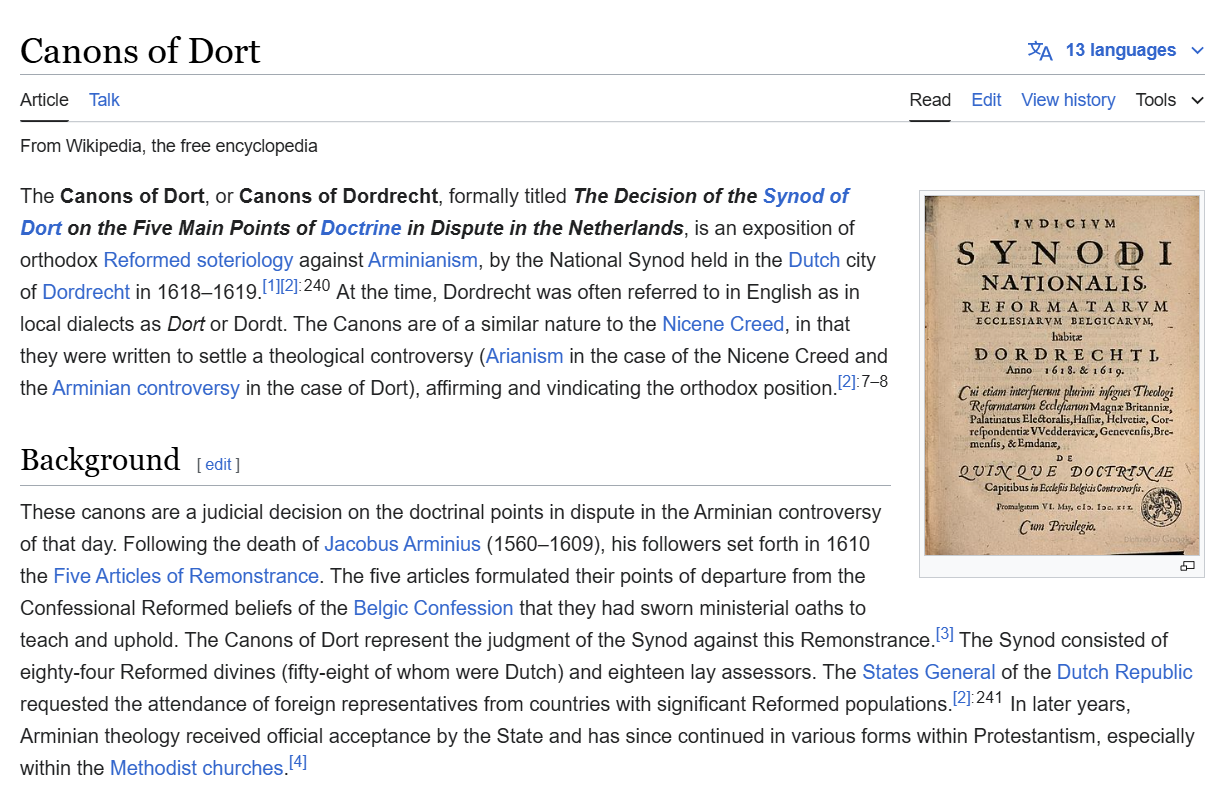
The Canons of Dort, or Canons of Dordrecht, formally titled The Decision of the Synod of Dort on the Five Main Points of Doctrine in Dispute in the Netherlands, is the judgment of the National Synod held in the Dutch city of Dordrecht in 1618–19.[1] At the time, Dordrecht was often referred to in English as Dort or Dordt.
Today the Canons of Dort form part of the Three Forms of Unity, one of the confessional standards of many of the Reformed churches around the world, including the Netherlands, South Africa, Australia, and North America. Their continued use as a standard sets apart the Reformed Churches from the doctrinal errors introduced from Roman Catholicsism that were adopted by Jacob Arminius, the Remonstrants.
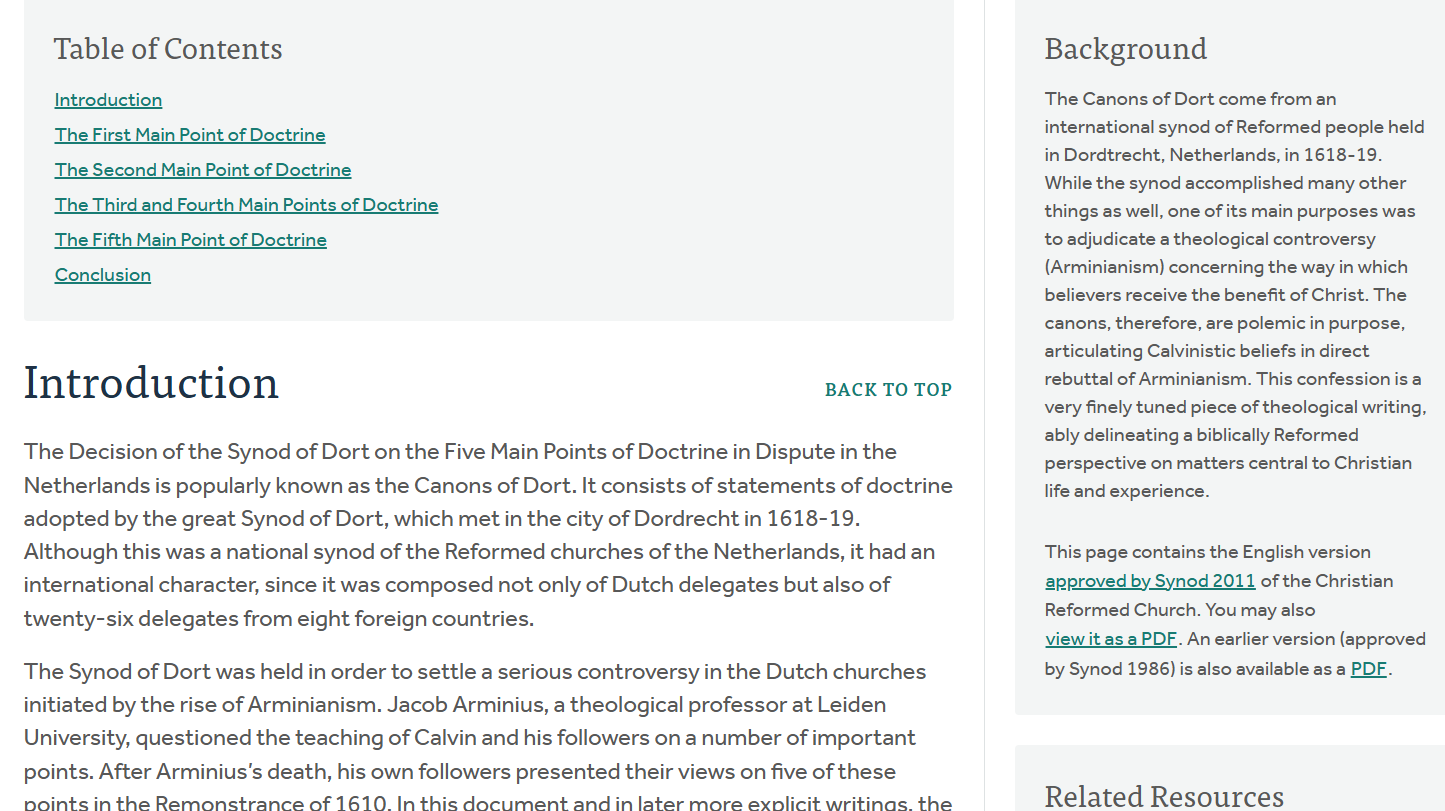
Although in form there are only four points in the Canons of Dort, we speak properly of five points, because the Canons were structured to correspond to the five articles of the 1610 Remonstrance. Main Points Three and Four were combined into one, always designated as Main Point Three/Four. Each of the main points consists of a positive and a negative part, the former being an exposition of the Reformed doctrine on the subject, the latter a repudiation of the corresponding errors. While the Reformed Church in America does not give confessional status to the Rejection of Errors, it nevertheless recognizes that the rejections help interpret the Canons by highlighting the specific errors addressed.
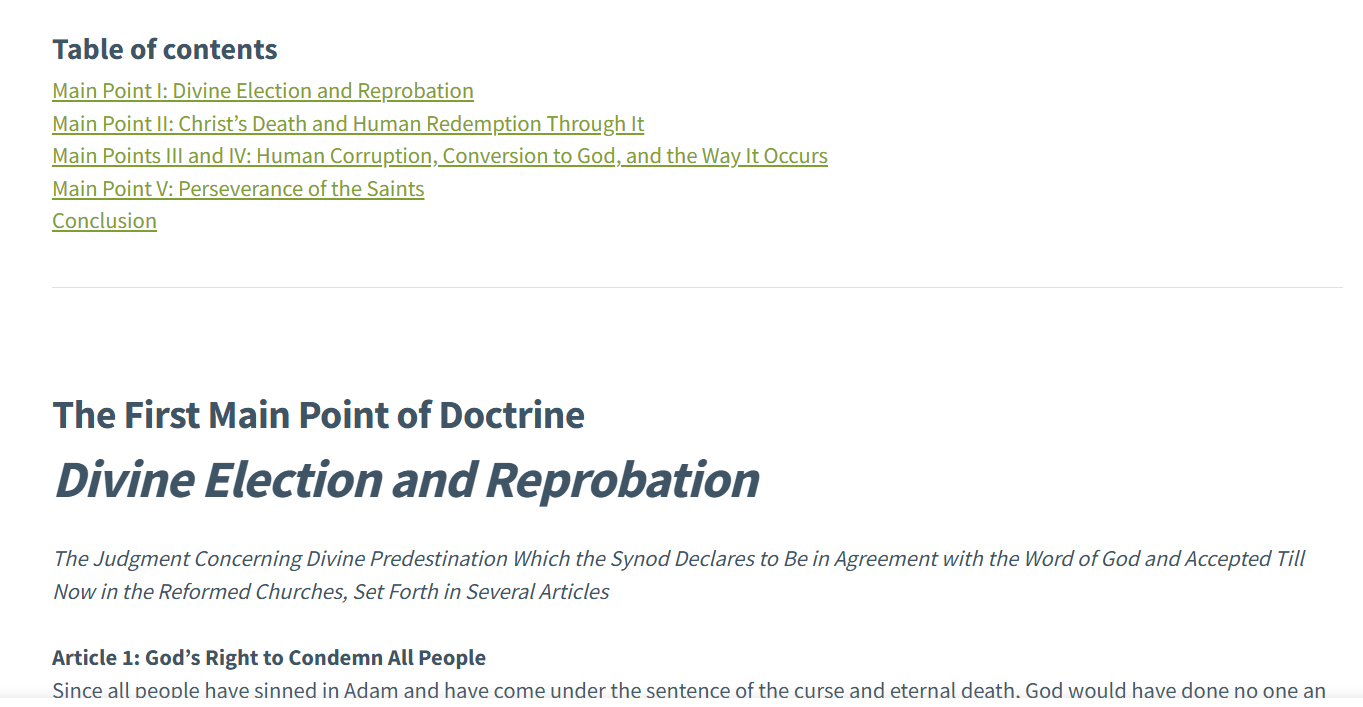
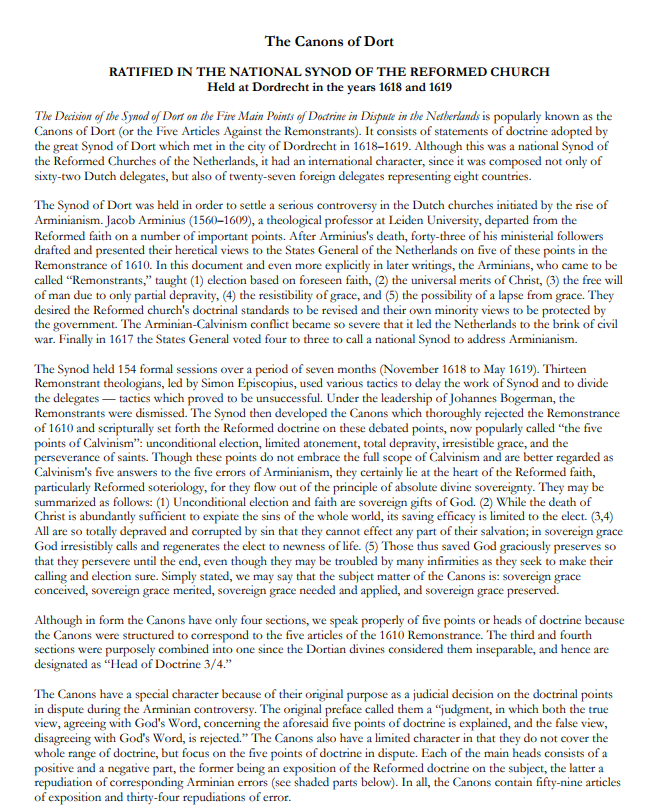
The Synod of Dort was held in order to settle a serious controversy in the Dutch churches initiated by the rise of Arminianism. Jacob Arminius (1560–1609), a theological professor at Leiden University, departed from the Reformed faith on a number of important points. After Arminius's death, forty-three of his ministerial followers drafted and presented their heretical views to the States General of the Netherlands on five of these points in the Remonstrance of 1610. In this document and even more explicitly in later writings, the Arminians, who came to be called “Remonstrants,” taught (1) election based on foreseen faith, (2) the universal merits of Christ, (3) the free will of man due to only partial depravity, (4) the resistibility of grace, and (5) the possibility of a lapse from grace. They desired the Reformed church's doctrinal standards to be revised and their own minority views to be protected by the government. The Arminian-Calvinism conflict became so severe that it led the Netherlands to the brink of civil war. Finally in 1617 the States General voted four to three to call a national Synod to address Arminianism
The Canons of Dort
Article 1: God’s Right to Condemn All People
Since all people have sinned in Adam and have come under the sentence of the curse and eternal death, God would have done no one an injustice if it had been his will to leave the entire human race in sin and under the curse, and to condemn them on account of their sin. As the apostle says: “The whole world is liable to the condemnation of God” (Rom. 3:19), “All have sinned and are deprived of the glory of God” (Rom. 3:23), and “The wages of sin is death” (Rom. 6:23).
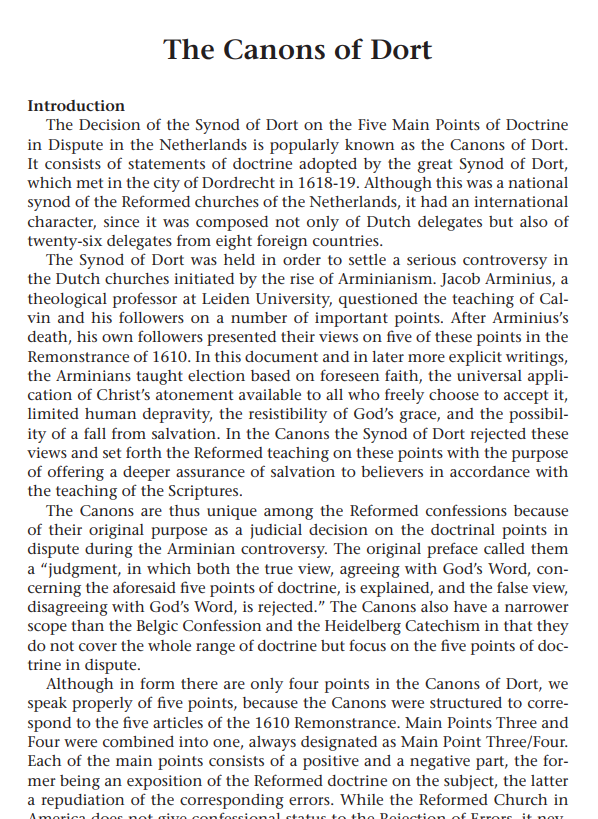
https://www.crcna.org/sites/default/files/CanonsofDordt.pdf
The Synod of Dort was held in order to settle a serious controversy in the Dutch churches initiated by the rise of Arminianism. Jacob Arminius, a theological professor at Leiden University, questioned the teaching of Cal?vin and his followers on a number of important points. After Arminius’s death, his own followers presented their views on five of these points in the Remonstrance of 1610. In this document and in later more explicit writings, the Arminians taught election based on foreseen faith, the universal appli?cation of Christ’s atonement available to all who freely choose to accept it, limited human depravity, the resistibility of God’s grace, and the possibil?ity of a fall from salvation. In the Canons the Synod of Dort rejected these views and set forth the Reformed teaching on these points with the purpose of offering a deeper assurance of salvation to believers in accordance with the teaching of the Scriptures. The Canons are thus unique among the Reformed confessions because of their original purpose as a judicial decision on the doctrinal points in dispute during the Arminian controversy. The original preface called them a “judgment, in which both the true view, agreeing with God’s Word, con?cerning the aforesaid five points of doctrine, is explained, and the false view, disagreeing with God’s Word, is rejected.” The Canons also have a narrower scope than the Belgic Confession and the Heidelberg Catechism in that they do not cover the whole range of doctrine but focus on the five points of doc?trine in dispute.
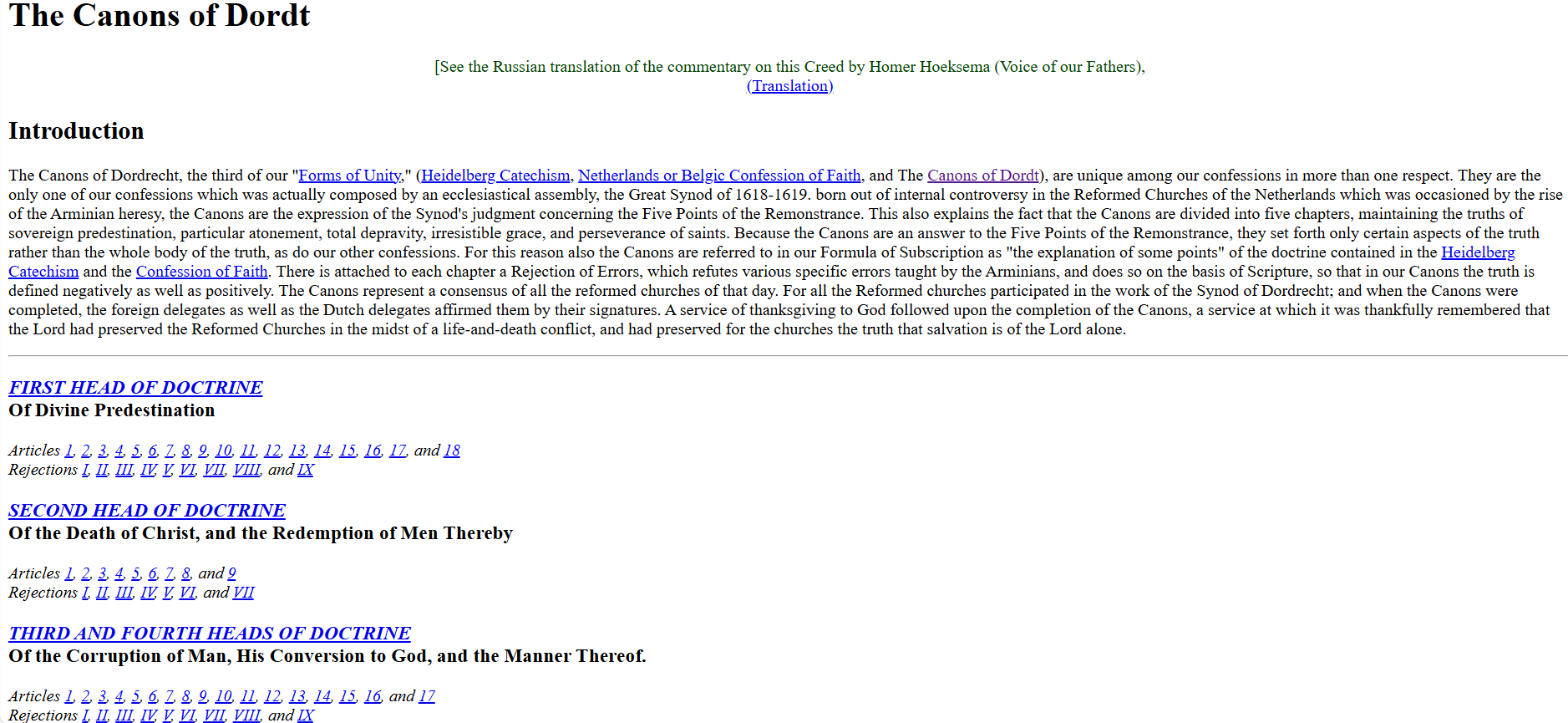
The Canons of Dordt (prca.org)
Introduction
The Canons of Dordrecht, the third of our "Forms of Unity," (Heidelberg Catechism, Netherlands or Belgic Confession of Faith, and The Canons of Dordt), are unique among our confessions in more than one respect. They are the only one of our confessions which was actually composed by an ecclesiastical assembly, the Great Synod of 1618-1619. born out of internal controversy in the Reformed Churches of the Netherlands which was occasioned by the rise of the Arminian heresy, the Canons are the expression of the Synod's judgment concerning the Five Points of the Remonstrance. This also explains the fact that the Canons are divided into five chapters, maintaining the truths of sovereign predestination, particular atonement, total depravity, irresistible grace, and perseverance of saints. Because the Canons are an answer to the Five Points of the Remonstrance, they set forth only certain aspects of the truth rather than the whole body of the truth, as do our other confessions. For this reason also the Canons are referred to in our Formula of Subscription as "the explanation of some points" of the doctrine contained in the Heidelberg Catechism and the Confession of Faith. There is attached to each chapter a Rejection of Errors, which refutes various specific errors taught by the Arminians, and does so on the basis of Scripture, so that in our Canons the truth is defined negatively as well as positively. The Canons represent a consensus of all the reformed churches of that day. For all the Reformed churches participated in the work of the Synod of Dordrecht; and when the Canons were completed, the foreign delegates as well as the Dutch delegates affirmed them by their signatures. A service of thanksgiving to God followed upon the completion of the Canons, a service at which it was thankfully remembered that the Lord had preserved the Reformed Churches in the midst of a life-and-death conflict, and had preserved for the churches the truth that salvation is of the Lord alone.
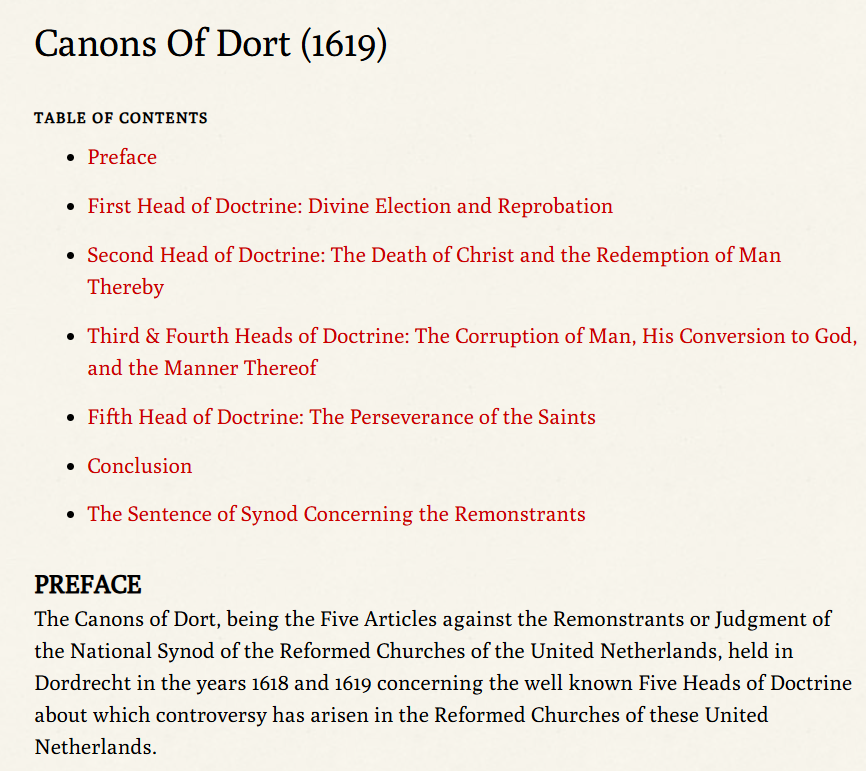
Canons Of Dort (1619) | The Heidelblog
PREFACE
The Canons of Dort, being the Five Articles against the Remonstrants or Judgment of the National Synod of the Reformed Churches of the United Netherlands, held in Dordrecht in the years 1618 and 1619 concerning the well known Five Heads of Doctrine about which controversy has arisen in the Reformed Churches of these United Netherlands.
Our Lord and Saviour Jesus Christ has given very many consolations to his Church Militant in this wretched pilgrimage. However, the one he left before he entered the heavenly sanctuary to go to his Father is justly considered to be the most important one: “And surely I am with you always, to the very end of the age.” The truth of this kind promise is evident in the Church of all ages. She has been attacked from the beginning, not only by the public force of enemies and the ungodly violence of heretics, but also by the masked subtleties of seducers. Truly, if the Lord had at any time left her naked without the beneficial consolation of his promised presence, she would have long ago been oppressed by the force of tyrants or led to her ruin by the subtlety of deceivers. But there is a good Shepherd who most steadfastly loves his flock and gave his life. He has always at the appropriate time by his outstretched hand, often in miraculous ways, put down the raging of persecutors. He has uncovered and destroyed the crooked ways and deceitful counsels of seducers. In all these ways, he has proved that he is truly present with his Church. Of this we have very clear proof in the histories of the God fearing Emperors, Kings and Princes whom the Son of God raised up so often to the aid of his Church. They were kindled with holy zeal for his house. By their service, he not only subdued the raging of tyrants, but also provided his Church, when she had to fight against false teachers, with means to healing and with holy Synods. In these Synods, faithful ministers of Christ, with their combined prayers, counsel and labour, placed themselves courageously in defence of the Church and the truth of God over against the servants of Satan (even though these had changed themselves into angels of light). The holy Synods removed the seed of error and of discord, preserved the Church in the unity of the pure religion, and passed on the genuine religion unblemished to posterity.
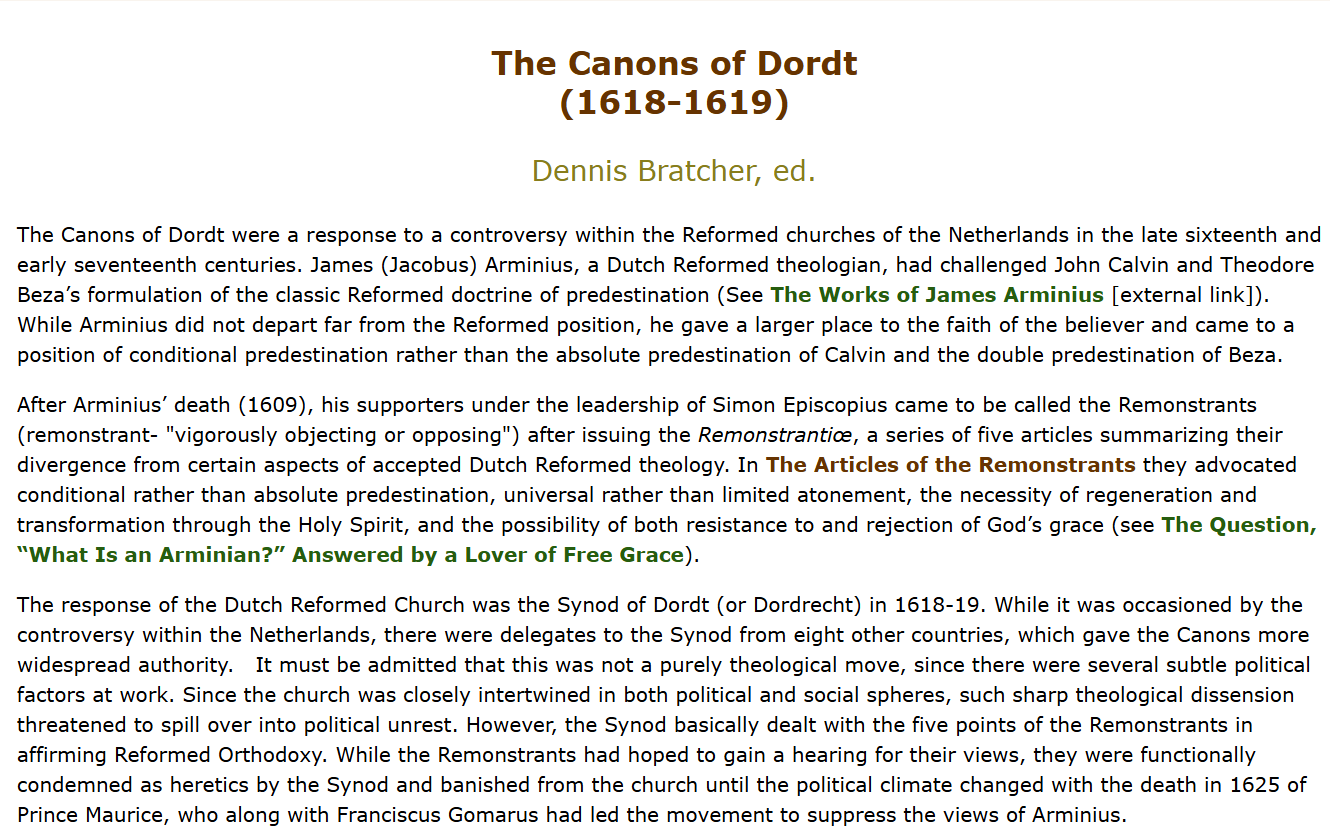
The Canons of Dordt (1618-19) (crivoice.org)
The Canons of Dordt were a response to a controversy within the Reformed churches of the Netherlands in the late sixteenth and early seventeenth centuries. James (Jacobus) Arminius, a Dutch Reformed theologian, had challenged John Calvin and Theodore Beza’s formulation of the classic Reformed doctrine of predestination (See The Works of James Arminius [external link]). While Arminius did not depart far from the Reformed position, he gave a larger place to the faith of the believer and came to a position of conditional predestination rather than the absolute predestination of Calvin and the double predestination of Beza.
After Arminius’ death (1609), his supporters under the leadership of Simon Episcopius came to be called the Remonstrants (remonstrant- "vigorously objecting or opposing") after issuing the Remonstrantiœ, a series of five articles summarizing their divergence from certain aspects of accepted Dutch Reformed theology. In The Articles of the Remonstrants they advocated conditional rather than absolute predestination, universal rather than limited atonement, the necessity of regeneration and transformation through the Holy Spirit, and the possibility of both resistance to and rejection of God’s grace